-
KAILI BLUES/LU BIAN YE CAN (Bi Gan 2015)
BI GAN: KAILI BLUES/LU BIAN YE CAN (2015)

A dreamy Chinese road picture that's a visual tour-de-force -- and an impressive debut
Chen Sheng (Chen Yongzhong), the protagonist of Bi Gan's complex and breathtakingly enthusiastic exploration of cinematic possibility, has for some time now been a country doctor, working in a small clinic with an an older woman doctor, Guang Lian (Zhao Daqing), in the subtropical province of Guizhou. In time through hints and finally his own crabwise confession in a barber shop, we learn that he previously spent nine years in prison, taking the rap for others. In the long dreamy sequence that makes up most of the latter part of the film Chen is on the road, initially at least in search of his nephew, Weiwei. He has believed that his gangster half brother, Weiwei's cruel father Crazy Face (Xie Lixun), had sold the boy. There are other differences with Crazy Face -- over inheritance of a house, and his mother's tombstone. On his trip Chen hopes not only to visit Weiwei but a former gangster associate known as Monk who now runs a watch shop and an old friend of Guang Lian's she's been dreaming of lately and wants to send a gift to; she says she's too old to travel.
So this is a road picture, one with elaborate motives and back stories, concepts and commentary with built-in homages to great Chinese filmmakers of the previous generations. But it's also simply a demonstration of the joy of filmmaking. From the outset Bi Gan shows a passionate awareness of the aesthetic possibilities of his rural Chinese milieu, of everything the eye of the camera encounters. The lens of his cinematographer Wang Tianxing, remarkably debuting here, seems to gobble up the diverse scenes, whether they be a sweeping verdant hill landscape, a jumble of rundown buildings and debris, a mobile crane performing a nimble maneuver off a truck, a bunch of motorcycles mounted by young men acting as rudimentary cabbies, or young toughs -- in classic scenes right out of iconic Hou Hsiau-hsien films -- hanging out, striking poses, and playing pool. Whether the material filmed is superficially "ugly" or "beautiful" or simply drab, it's arranged on screen in ways that show a sure eye and a keen sense of composition. But the scene is what matters, not some arbitrary arrangement.
And then, along Chen's journey by train, bus, truck, and motorcycle, the camera takes flight, following people around and weaving in and out the hillside town for a 40-minute unbroken long take in the virtuoso tour-de-force manner of Aleksandr Sokurov's Russian Ark, but focused not on period costumes and museum art works but humid landscape, scruffy men, pretty women, roads, motorcycles, interiors with decaying walls.
The search, which is also a memorial journey, taking Chen to the riverside city of Kaili and town of Dang Mai, has seemed primarily motivated by concern for the well-being of Weiwei (Luo Fengyang as a youth, Yu Shixue older), whom he meets magically by chance. But voiceovers of poetry, the mesmerizing camera movements, begin to suspend us in a magical present time, like a drug high, where plans and goals are suspended and nothing matters but everything is hyperreal. We are there. China, this awesome, terrifying, destroyed and destroying country, seems magical again. One is brought back to the early films of Wong Kar-wai, Hou, and Jia Zhang-ke. (Others have seen a link with the Thai Cannes darling and explorer of magic and ghosts, Apichatpong Weerasethakul, but that seems more of a stretch. The director, barely thirty, has mentioned Andrei Tarkovski as an influence.
Reviewed by Derek Elley for Film Business Asia in his typical meticulous but not infrequently grumpy manner, Kaili Blues doesn't fare so well. Obviously, more is going on than we can possibly gather in one or even many viewings, and we need a guide. Elley helpfully points out that the Chinese title means "Roadside Picnic," and is the name of the main character's anthology of poems. Elley grants that the filming is a tour-de-force: "In sheer planning — as the camera follows the doctor on a motorbike, up and down stairs, into people's homes, on a river ferry, and across a bridge — it's a considerable achievement, with hardly a glitch." But Elly is unmoved. He doesn't see this as a meaningful explication of the narrative or character, or as having the mystical quality that is desired, as suggested by the voiceover "foggy poems" (as he condescendingly calls them) attributed to the main character (and actually by Bi Gan, who is a published poet).
But I was thrilled, and found the latter sequences of Kaili Blues made me feel high -- high on this exotic world, on the joy of filmmaking and film-watching. I remembered the excitement when a tip in the San Francisco paper led me to a hitherto unknown movie house in Chinatown (or so I remember it) and I saw the first two films of Wong Kar-wai. I didn't make much sense of them then. But I had entered a new world, and was hooked. What Elly calls "a conventional Mainland indie" is dense with ethnographic detail (indlucing visits to the Miau people from whom Bi Gan comes, the locations being his native region), a Diamond Sutra epigraph, intricate motives and backstories (with possibilities for future development) and it's not at all out of place for John DeFore to say in his Hollywood Reporter review that Kaili Blues "invites academic thesis-level dissection." But he is also right to add -- we feel the freshness of the energy and enthusiasm -- that "thanks in part to Chen's unforced performance, it never feels pretentious." Whoever wrote in the ND/NF blub calling this "one of the most audacious and innovative debuts of recent years" was certainly on the right track (despite a surprising lack of buzz since Locarno). There could be a glorious future here.
Kaili Blues/Lu bian ye can/ 路邊野餐, 113 mins. debuted at Locarno, where it won Best Emerging Director and Special Mention awards.It also won the Montgolfière d'or award at the Nantes Festival of the Three Continents and also has been in the Vancouver festival, where one blogger noted technical flaws in the long hillside take camerawork. Shelly Kraicer provides loving details in a piece reprinted in Cinemascope. It has been hailed by French critics ("of an unheard of virtuosity," Liberation; "a splendor," Les Inrocks) and it's coming out in France 23 March. Screened for this review as part of the 2016 Film Society of Lincoln Center-Museum of Modern Art series New Director/New Films. It will show Mon. 21 Mar. at 6:30 p.m. at MoMA and Wed. 23 Mar. at 6 p.m. at the Walter Reade Theater, Lincoln Center.
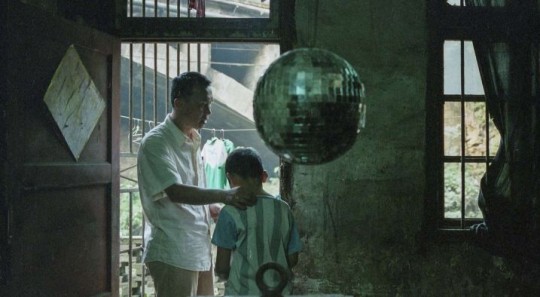

Last edited by Chris Knipp; 03-05-2016 at 05:42 PM.
-
Shorts program 2
SHORTS PROGRAM 2

THE DIGGER
Shorts Program Two
The Digger
Ali Cherri, Lebanon/France/UAE, 2015, 24m
Arabic and Pashto with English subtitles
With ritualistic serenity, a lone caretaker maintains ancient graves in the Sharjah Desert long after the bodies are gone. North American Premiere
This is a beautiful, dignified visual poem, with no voiceover. The only text is printed literary Arabic. It's probably the best and most memorable of the program, but what can you say about it?
We All Love the Seashore / Tout le Monde Aime le Bord de la Mer
Keina Espiñeira, Spain, 2016, 16m
French and Pulaar with English subtitles
A poetic distillation of the liminal space of refugees and migrants, developed collaboratively through encounters on the African coast of the Mediterranean. North American Premiere
"Poetic distillation" means that while actual refugees are used, this like the rest is an art piece. The are highly scripted, arranged, and poeticized. Which given the global refugee crisis at present seems a bit out of touch with reality.
Of a Few Days
Timothy Fryett, USA, 2016, 14m
On the South Side of Chicago, final touches on one’s
journey on Earth are meticulously made in a decades-old community funeral home. North American Premiere
A close look at a few details of how a funeral home is run and the preparing of the dead. Not really quite a documentary though, because like the other films here, it is highly selective.
The Park / Le Park
Randa Maroufi, France, 2015, 14m
French and Arabic with English subtitles
A series of tableaux vivants mesmerizingly locate the intersection of public space, inner lives, and social media within an abandoned Casablanca amusement park. U.S. Premiere
The strangest and most interesting short in this set because I haven't seen anything like it before. Very suggestive. But I had no idea what this was about, and I'm not sure if we're expected to know. There may be some reference to recent crimes or gang battles or something. The "dialogue" in French and/or Moroccan Arabic is fragmentary, and comes and goes before you can make it out. The "tableaux vivants" are really that. Groups of nice looking young people, mostly men, are frozen in place, some with knives raised as if about to strike, though they have pleasant expressions. The camera moves around among them. They really don't move. At most one guy's eye moves. But what could it possibly mean? A good art piece to show in a museum. No feature film potential imaginable. Hence the New Directors jury in this section have chosen to marginalize the festival.
Last edited by Chris Knipp; 03-03-2016 at 07:55 PM.
-
EVOLUTION/ÉVOLUTION (Lucile Hadihalilović 2015)
LUCILE HADŽIHALILOVIĆ: EVOLUTION/ÉVOLUTION (2015)
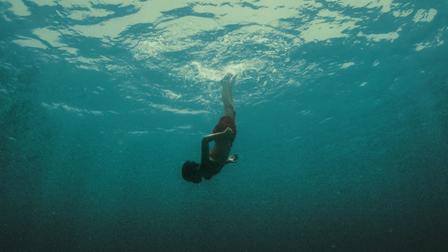
MAX BRABANT IN EVOLUTION
Boys, water, and women
Her name is a nightmare to spell, though a non-accented version is also accepted and seems preferred by French Wikipedia, Hadzihalilovic. She won admiration from cinephiles for her exquisitely arcane, disturbing 2004 feature, Innocence. She's taken a long time to get around to another feature, but in 2009 she collaborated with spouse Gaspar Noë on his Enter the Void. Her debut was the 52-minute 1996 film La bouche de Jean-Pierre , in Un Certain Regard at Cannes -- not reviewed on AlloCiné, but viewers' comments on it there are favorable.
Anyway, Evolution is her second strange take on childhood and sexual development, and while the first focused exclusively on young girls, in this one it's young boys being giving creepy raising/treatment by women, who may or may not be their moms. Innocence was the (by report ) faithful adaptation of a boarding school-set novella by Frank Wedekind (the German 1880's author of Spring Awakening), this one is all hers. It focuses on the experiences of 11-year-old Nicolas (Max Brebant, a good swimmer who glows with health), a boy who wonders if he is sick and why strange things are happening to the other boys, notably their being sent to a hospital for mysterious treatments.
Like its predecessor an elaborately staged and beautifully photographed film with everyone in coordinated costumes, like a ballet, Evolution is a kind of Jungian science fiction of reversed sexual roles and amphibious birth. It all happens in a little town of primitive white houses by a rocky coast where the sear roars up onto volcanic-looking surfaces. (The scenes were shot at Lanzarote, in the Canary Islands.) It is populated only by women and boys, both of whom often return to the sea and swim, and there are constant references to red starfish. Nicolas is swimming underwater in the first human scene (before that we see a glorious wide under-waterscape of flowing seaweed and coral, all the cinematography by Manu Dacosse, who shot The Strange Color of Your Body’s Tears), and tells his mother he has seen a dead boy under water with a starfish on his belly. She says he's wrong.
Nicolas and the other boys are given dark liquid medicine every day, fed a diet of what looks like seaweed mixed with white worms, and given injections. Eventually it develops that roles are reversed, and they, instead of the women, are to have babies. What they give birth to we don't know, but it may be small fetuses, amphibious, perhaps? Nicolas draws -- though why this is important, we don't know -- and is increasingly disgusted and uneasy, as are we.
There is material for a hundred film student theses here, but nothing a viewer can come away with. This, like Innocence, is nothing more than an exquisite art film for a cult audience that will leave more mainstream audiences puzzled and indifferent if not actively repelled. I did not expect to like it, and I did not, though I was impressed by the beauty and distinctiveness of the images.
I don't think Hadzihalilovic knows how to tell a story, or is going to learn. And that's a shame, because she comes so close. She makes beautiful films. But they are stifling and airless. Their festival and cinephile cult potential is bright, their theatrical release future, relatively dim. In his excellent Variety review Peter Debruge classifies Evolution as a "yet another stunning, squirm-inducing contribution to the New French Extremity movement, as practiced by her husband Gaspar Noë and others."
Evolution/Évolution, 81 mins., debuted at Toronto. Many international festival showings, including Fantastic Fest, London, San Sebastian (Special Jury Prize and Best Cinematography), and Dublin (Best Director). Screened for this review as part of the 2016 New Directors/New Films series at Lincoln Center and MoMA, New York. Scheduled for theatrical release in France 16 Mar. 2016.
Opening theatrically 25 Nov. 2016 in the US at the IFC Center, Film Society of Lincoln Center (NYC) and on VOD.
Last edited by Chris Knipp; 10-03-2016 at 04:20 PM.
-
LOST AND BEAUTIFUL/BELLA E PERDUTA (Pietro Marcello 2015)
PIETRO MARCELLO: LOST AND BEAUTIFUL/BELLA E PERDUTA (2015)
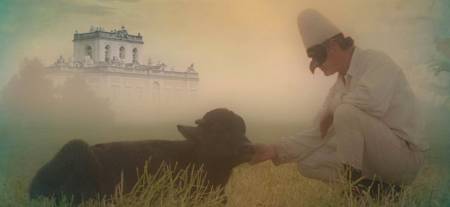
Gesuino Pittalis in Lost and Beautiful
A docu-fiction fable of preservation set in its maker's native Capania, in southern Italy
In a kind of documentary turned art film, Pietro Marcello offers in Lost and Beautiful a whimsical, goofy, touching, ultimately overlong and irritating mythical tale spun out of a real event. He was called l'angelo del Carditello. Marcello filmed the poor shepherd Tommaso Cestrone, famous in the local Campania region for voluntarily, and in spite of Camorra threats, caring for the Bourbon palace of Carditello, which the government was neglecting. But during the shooting, on Christmas Eve, Tommaso died of a heart attack, and Marcello rethought his film. He chose to turn his focus on a baby buffalo Tommaso had taken as a special pet and named Sarchiapone, and spun out a fable about Sarchipone's fate.
Marcello brings in the Commedia dell'Arte figure Pulcinella (Sergio Vitolo), coming to save Sarchiapone from the slaughterhouse, and there is a running voiceover spoken by Sarchiapone (the voice of Elio Germano, of My Brother Is an Only Child), recounting his poor beast's life. Writing a review on the Italian website MyMovies, Emilio Sacchi says Marcello is describing here the "growing gap between Italy and the Italians." A raft of liberal Italian newspapers linked to on MyMovies -- L'Espresso, La Stampa, Il Mattino and La Repubblica -- all sing the praises of this film by the maker of The Mouth of the Wolf (2009) and Crossing the Line (2007). But it seemed to me rough looking, overly whimsical, visually repetitious, and meandering, and I do not think it will appeal much to a wider theatrical audience outside of Italy, despite its references to Italian tradition, government indifference, and mafia exploitation, common to most films and literature coming from this region.
It was co-written by Maurizio Braucci, a screenwriter on Matteo Garrone’s Gomorra.
Lost and Beautiful/Bella e perduta, 87 mins., it won the Youth Jury Prize and the international competition prize when it debuted at Locarno, where reportedly it got a long round of applause. So that's Locarno. It was released in Italy 19 Nov. 2015.
Last edited by Chris Knipp; 03-05-2016 at 09:07 AM.
-
I PROMISE YOU ANARCHY (Julio Hernández Cordón 2015)
JULIO HERNÁNDEZ CORDÓN: I PROMISE YOU ANARCHY/TE PROMETO ANARQUÍA (2015)
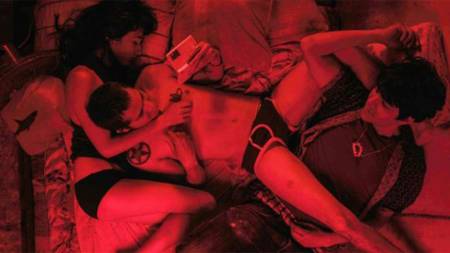
DIEGO CALVA (RIGHT) IN I PROMISE YOU ANARCHY
"Arty mash-up of crime thriller and full-frontal bromance"
Stephen Dalton's Toronto review in Hollywood Reporter isn't flattering ("Skaters battle haters in this muddled, misfiring Mexican melodrama"), but admits the action is vivid and the film sometimes stylish. Playing with urban Mexico City atmosphere and its scruffy gathering of marginal young men whose every other word is a chinga or a pendejo or a cabrón, Guatemalan-born director Julio Hernández Cordón doesn't really generate enough heat or tell a compelling enough story. He lacks the storytelling skills to juggle or coordinate bromance (or bisexual relationship), generational angst, blood trafficking deal gone wrong, and confused lifestyle and come up with a movie that makes sense.
Miguel (Diego Calva) and Johnny (Eduardo Eliseo Martinez) are two young skateboarders who like to have sex, do drugs, skateboard naked, and make money giving blood sold to gangsters and getting others to do so, so Cordón would have us believe. Starting out with a party where there are hints of gay sex, the film suggests a degree of wildness that's not followed up upon.
Though Calva is tall and handsome, nobody, not even he really, has much style or charisma. His best mate Johnny, with whom he has a running quarrel, turns out to be the son of his family's maid -- a social difference that may faintly echo the relationship between Gael García Bernal and Diego Luna in Alfonso Cuarón's debut feature Y tu mamá también, but the filmmaking here is not of that caliber. Cordón relies on documentary elements that rarely bear full fruit. The greatest success is a gathering at which an intense young man take s hit of a hash pipe and launches into an impassioned, powerful rap poem about his country and his generation. It is the high point of the film. If only anything else here were as intense, intelligent and real -- but nothing is.
Later, Johnny and Miguel's confused and confusing blood sale scam (it's never quite clear how it works, or why their encounter with a gangster is such a surprise to them), which leads to a large group of their friends and street people who agreed to participate are loaded into a truck -- and kidnapped. This was not what Johnny and Miguel intended, and in the process Miguel has also lost his father's Jeep station wagon. After this there is a murder and the existing conflicts between the feckless Johnny and the more ambitious but weak Migues grow more and more intense. But there's no adequate response to the disaster of the mass kidnapping they're responsible for: they just get high and play about and have sex; there's no follow-up. The movie feels thrown together. There are periodic intense musical moments, described by Dalton as ranging from "vintage alt-rockers Galaxie 500 to a terrific Spanish-language version of the pop standard 'Sunny' by Mexican guitar-twangers Los Iracundos."
The best Mexican film I have seen recently is Alonso Ruizpalacios' Güeros, an delightfully atmospheric road movie about the search for a musical idol at the time of the year-long 1999 university strike. It is full of visual wit, profound in its sense of the period, rich in cinematic style, and intelligent. So that's possible.
I Promised You Anarchy/Te prometo el anarchía, 89 mins., debuted at Locarno, showing in over a dozen other festivals including Vancouver, Rio, Havana and Miami. Five prizes and four nominations. Screened for this review as part of the 2016 New Directors/New Films series (FSLC/MoMA) in New York, Mar. 2016.
Last edited by Chris Knipp; 03-06-2016 at 08:54 AM.
-
SUITE ARMORICAINE (Pascale Breton 2015)
PASCALE BRETON: SUITE ARMORICAINE (2015)
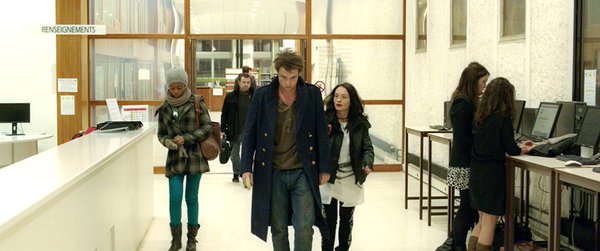
KAOU LANGOËT AND ELINA LÖWENSOHN (CENTER) IN SUITE ARMORICANIE
A coming-of-age story and exploration of memory and place
Pascale Breton's fascinating and satisfying new film, her first feature since her distinctive 2004 debut, Illumination (SFIFF 2005), dramatizes her autobiographical protagonist's return to her native Brittany. A festival blurb calls this a "rapturous ensemble film about the persistence of the past in the present." It is that, and despite its nearly two-and--half-hour length, I found it a continual pleasure for its handsome use of digital imagery, its layered screenplay, and its interesting characters. The plot revolves around Françoise (Valérie Dréville), a gifted art historian who leaves Paris and her longtime companion, with whom she's lived for fifteen years, to teach at her alma mater in Rennes. She says she has begun to find Paris "stifling." In Rennes she encounters former schoolmates, many of whom have never left. As she arrives at the university so does a tall, poetic and slightly wild geography student with exploding hair called Ion (Kaou Langoët), who quickly falls in love with a beautiful and assured blind girl called Lydie (Manon Evenat). Ion has issues, for good reason, with his wayward mother, ex-hyppie Moon (Elina Löwensohn), to whom Françoise used to be very close. The separate threads -- though we guess that sooner or later Françoise and Ion will come together -- allow Breton to explore Françoise's past and present, even, toward the end, her childhood, when she used to fetch plants for her grandfather, a Breton healer. Through Ion, Breton explores the development of a youth in the present moment.
Geography and art history are important themes. So are meetings and reconnections. It's not surprising that eventually Proust is mentioned and there's something Proustian about the way Lydie can identify Ion by his smell. "Armorica" is an ancient geographical designation to a region roughly comprising Brittany and a bit more. In one of their first geography classes Ion and Lydie are shown how to use a stereopticon device to look at a topographical photograph. Of course she can't see it, just as one can't recapture one's past. Françoise has a black and white photograph of revelers from the early Eighties in which she and others appear. They include Moon, and John Le Scieller (Laurent Sauvage), now a successful musician, whom "everyone was in love with then" because he was "super-handsome," but Françoise barely know. Now, John seeks her out. There is also the slightly crazy "La Grande Catherine" (Catherine Riaux) whom Françoise drinks wine and dances with in her swaying tower apartment at what was to have been a party where her former lovers would appear, but without her knowledge it was cancelled.
Ion is a bit of a wild and wayward boy, like Ildut Le Du (Clet Beyer), the disturbed protagonist of Breton's first film Illumination, who hears voices, becomes cut off from the world, and is only motivated to get better after he becomes obsessed with a young woman. Ion denies that Moon is his mother. When she turns up and meets him for the first time in four years, invading his dorm room with her seedy boyfriend Dav (Tangi Daniel) and two cronies, he lets them stay, but flees and begins to live like a homeless person himself, though somehow still pursuing his studies. There is a thread of wildness that runs through the film, somehow balanced by Françoise's intelligence and her impressive, soothing performances in the classroom. But she has a dream (handsomely realized) in which a large sphinx blocks every roadway, and the ATM machine is only in the Breton language. Her grandparents spoke it fluently, her parents only a little; she knows only a few words. But two young men from the university's department of Breton and Celtic Studies interview her, and she recovers "frozen" memories of her grandfather that make her weep.
The film brings art history to life, not only with Françoise's lectures but her visits to the Rennes Museum of Fine Arts, where she goes repeatedly but notes to her class she has seen none of them -- except that she unknowingly crosses paths there with Ion, sitting on a bench contemplating George de la Tour's (typically) striking painting, "Newborn Infant." The way painting interpretation appears reminded me of John Schlesinger's A Question of Attribution, and the memorable use of an art museum brought to mind Jem Cohen's subtle docudrama Museum Hours (SFIFF 2013).
Françoise's lectures are interesting. Perhaps a bit obvious but nonetheless touching is her first one (even previewed in her sound test of her mike) when she shows a blowup of Poussin's painting "Les Bergers d'Arcadie" which contains the Latin phrase "Et in Arcadia ego," "I too was once in Arcadia," a reference to her having been where her students now are, and that theirs is an idyllic age. In her final lecture she offers the notion that the Romantics were not so much in harmony and in love with Nature but frightened of its alien power -- an idea that somehow resonates with the geography theme.
Suite Armoricaine has some repeats of scenes from another point of view, slipping from Françoise's to Ion's, and brief flashback images of Françoise's memories, and her meetings with former associates are explorations of the past. But an equally important focus is the "forever youthful" Armorican Arcadia of the university of Rennes, and a handsome use of digital shows in first green landscapes, then wide nighttime panoramas of the built up campus, as the film moves through the months of the scholastic year, from Françoise's adjustment to memories and fear of the new place, the first lectures, and Ion's wild winter time haunted by Moon, losing touch with Lydie, to the pleasant arrival of summer, with promise of sunny travels -- to the town of Françoise's childhood and, for a healthier, happier Ion, to Greece with Lydie.
Suite Armoricaine might have benefitted from being tightened up and made more focused on a few important scenes. Some critics at least seem to think so. But it's nonetheless a wonderfully complex, rich, and intelligent film. It's a pity Pascale Breton doesn't make more and one can only hope it won't be so long till her next one.
Suite Armoricaine, 148 mins., debuted 13 Aug. 2015 at Locarno. One other festival, and Lincoln Center-MoMA's New Directors/New Films, where it was screened for this review. Pascale Breton has made many shorts and worked for TV, but not directed any other feature but this since Illumination. Suite Américaine comes out in France 9 March 2016. It has so far gotten only four reviews, adding up to a very mediocre 3.0 press raint on AlloCiné. It got raves from Cahiers du Cinéma and Transfuge and pans from two other publications that found it too self-regarding and lengthy. Illumination would up with a 3.3 but Cahiers and Les Inrocks were very favorable.
Last edited by Chris Knipp; 03-08-2016 at 05:01 AM.
-
MOUNTAIN/HA'HAR (Yaelle Kayam 2015)
YAELLE KAYAM: MOUNTAIN/HA'HAR (2015)
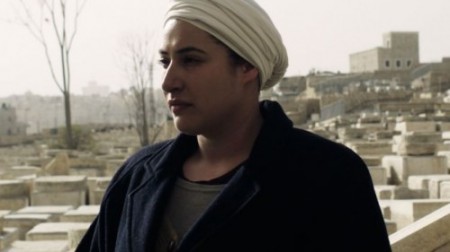
SHANI KLEIN IN MOUNTAIN
Ignored Jewish Orthodox wife in Jerusalem takes a walk on the wild side
Tzvia (Shani Klein) is a housewife and proper Orthodox mother of four and wife of Yeshiva teacher Reuven (Avshalom Pollak, who is often out after dinnertime and pays little attention to her. They live in a cave-like dwelling embedded along the edge of a Jewish cemetery on Jerusalem's Mount of Olives. In her frustration Tiva makes it a habit of going out to the cemetery at night, sometimes in the daytime, for a smoke. More often than her husband would approve, she has conversations and shares smokes with the Hebrew-speaking Arab maintenance man of the cemetery. After a while she discovers that whores have sex with johns by the tombs, and their pimps or handlers are there too, at night. She starts hanging around there and bringing home-cooked meals to build some sort of relationship with these people. They regard her as pathetic or a freak but she nonetheless has conversations with them. The failure of her marital life and her frustration with her children lead her to increasing desperation. She seems literally entombed. The film ends with a violent action whose exact outcome is left unclear.
The film develops slowly. As Jay Wissberg explains in his detailed Variety review, initially outside of her family Tzvia's only contact is with Abed (Haitham Ibrahem Omari), the Palestinian caretaker of the cemetery. Relations with him are formal and polite but she's detached from him because he's a man and probably also because he's a Palestinian. When she encounters a drunken prostitute, she feels more at ease, even though she's "disrespected." Actually, Tzvia's relationship with the seedy characters at the edge of the cemetery at night remains limited, and repeated scenes show little development. Kayam clearly is seeking a slow burn, but almost winds up with a fizzle.
I found it difficult to warm to this film, which lacks the force or the brilliance of other recent films featuring Orthodox Jews, such as the beautiful (if questionable: it's like an ad for female enslavement) marriage film Fill the Void (NYFF 2012)and the stunningly powerful, grim tale of a doomed gay love affair between Orthodox butchers, Eyes Wide Open. I liked the Orthodox drug mule story (based on fact), an unusual role for Jesse Eisenberg, Holy Rollers. Also notable for rich detail, despite initial stiffness, is the French Canadian film about an ultra Orthodox woman's affair with a secular man Felix and Meira, with its detailed portrait of a relationship. Mountain also lacks the vividness and complexity of Nadav Lapid's films, especially his latest, The Kindergarten Teacher (ND/NF 2015). Yaelle Kayam's method seems blunt and simplistic here, the material more like a short story than a feature film. Nonetheless as Tzvia, Shani Klein has a strange mixture of plainness and luminosity that is memorable, and some of the bleached-out images of the cemetery are rather unique. Besides which this is another not-so-subtle suggestion that Orthodox Jewish life is too stifling to bear -- at least for women.
Mountain/Ha'ar, 83 mins., debuted at Venice in the Orizzonti section, and showed at half a dozen other festivals, including Toronto; and New Directors/New Films, where it was screened for this review.
Last edited by Chris Knipp; 03-21-2016 at 09:18 PM.
 Posting Permissions
Posting Permissions
- You may not post new threads
- You may not post replies
- You may not post attachments
- You may not edit your posts
-
Forum Rules







 Reply With Quote
Reply With Quote






Bookmarks